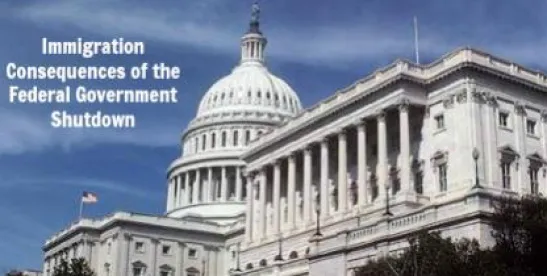The Senate and House of Representatives are on a scheduled recess this week, set to return to legislative work on Monday, February 23.
Both chambers adjourned without any resolution to the dispute over continued funding for the Department of Homeland Security (DHS). The current appropriations measure for the agency expires on February 27, leaving little time for the two chambers to come to agreement. While the House of Representatives passed a bill on January 14 to provide $40 billion in funding for DHS through the end of the fiscal year, the Senate has stalled, unable to bring the House-passed bill up for consideration. At issue is the inclusion of policy riders attached by the House to nullify President Obama’s recent Executive Orders on deferred action for immigrants in the country illegally and attendant benefits. Democratic Senators are opposed to the policy riders and have demanded the Senate take up a clean appropriations bill without policy riders. Without any Democratic support to move forward on the House-passed bill, Senate Majority Leader McConnell has failed for two weeks to achieve the necessary 60 votes to invoke cloture on the motion to proceed to the bill, so the Senate has been unable to start debate and consider amendments. The Majority Leader has indicated he will hold another cloture vote on the motion once Senators return to Washington, D.C., but it is highly unlikely he will garner any additional votes this time. The Majority Leader’s strategy after the next cloture vote is unclear. A short-term extension of current funding for DHS may be the most likely scenario, while leadership tries to work out an agreement. A series of stop-gap, short-term funding bills for DHS through the end of the fiscal year may be the most likely outcome, but some Republicans are urging the agency be forced to shut down. At this point, the future on DHS funding is murky.
The politics of the current debate and between chambers could spread to other upcoming legislative battles that on their own were likely to be quite contentious. The federal debt limit is scheduled to be reached in mid-March, although the Treasury Department has indicated that record tax revenues may give the government room to borrow the existing ceiling until the fall. Still, at some point, Congress will need to vote on raising the debt limit. The current patch for averting steep cuts to Medicare payments to physicians expires March 31. The statutory deadline by which Congress must pass a budget is April 15, and adoption of a budget is vital if Republicans want to use the vehicle of reconciliation to try to enact significant legislation. The current highway funding bill expires at the end of May. Authorization for the Export-Import Bank will expire in June. Portions of the USA PATRIOT Act will lapse at the start of June unless renewed. The spring promises to be a busy one on Capitol Hill.
It remains unclear what the Senate will turn to once the DHS funding issue is resolved. One possibility is a vote to overturn President’ Obama’s veto of the Keystone Pipeline bill. Last week, before the recess, the Senate Judiciary Committee held over the nomination of Loretta Lynch to be U.S. Attorney General. We anticipate the committee will take up this nomination and that of Michelle Lee to head the U.S. Patent and Trademark Office the week the Senate returns. The full Senate may well consider these nominations early in March, though some Republicans continue to want to block the Lynch nomination from a vote to continue to fight the President’s initiatives to assist illegal immigrants. Bipartisan tax reform measures may be another item on the agenda, as the Senate Finance Committee reported out 17 different bills on February 11th. The bipartisan measures, fully paid for and reported out together by voice vote, include a new credit for military spouses, a new tax credit for waste-heat-to-power investment, and several bills aimed at the beer and alcohol industry. While tax bills must originate in the House to become law, Senate passage of these bills could stir action on House versions of them.
The House will return next week to resume consideration of its own tax relief legislation. Last week, the House Ways and Means Committee adopted three tax relief measures: a bill to expand the use of 529 college savings plans; a bill to make permanent the state and local sales-tax deduction; and a bill to make permanent the research and development tax credit. These bills could well see action when the House returns. Before the end of this month it is expected that the House will also turn to consideration of elementary and secondary education reforms. On February 11, the House Education and Workforce Committee approved H.R. 5, the Student Success Act, an update to the No Child Left Behind Act. The bill passed the committee by a vote of 21-16, along party lines. A similar measure passed the House in 2013, with only one Democratic vote but was never considered by the then-Democratic-controlled Senate. Work on a more bipartisan bill is seemingly underway in the Senate. Senate Health, Education, Labor and Pensions Committee Chairman Lamar Alexander (R-TN) and Ranking Member Patty Murray (D-WA) released a statement on February 6 saying they were working together on a Senate proposal to update No Child Left Behind. Chairman Alexander has indicated he would like to have a bill ready for consideration by the full Senate by March 1, adding another important issue to the challenging agenda already confronting Congress for the spring.
One more issue of note that looms over Congress. The FCC is expected to adopt at its February 26 meeting net neutrality rules. The rules are already absorbing considerable legislative and oversight attention. Oversight and legislative committees of jurisdiction in both chambers have been looking closely at the Administration’s role in the development of these new rules, as the FCC is ostensibly an independent agency. The House Oversight and Government Reform Committee and the Senate Homeland Security and Government Affairs Committee have both launched investigations into whether the Obama Administration exerted any influence over FCC rulemaking. The House Energy & Commerce Committee and the Senate Commerce Committee will no doubt also take hard looks at the substance of the rules. Litigation over the rules is certain, and a legal challenge over a prior FCC effort to regulate in the area was successful. So Congress may not need to act immediately. Nonetheless, the issue is critical to the continued development of the Internet and is sure to attract lots of attention in Congress.
When they return next week, both House and Senate authorizing and appropriations committees will continue to hold hearings focused on the President’s Fiscal Year 2016 Budget. This week, a field hearing is scheduled for the Senate Small Business and Entrepreneurship Committee on February 19 at 11:30 a.m. in Shreveport, Louisiana to discuss “Innovative Education Systems”.




 />i
/>i

